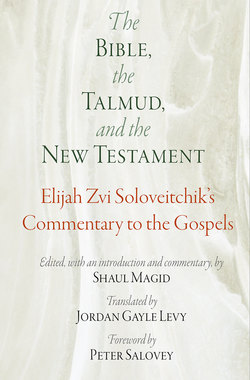Читать книгу The Bible, the Talmud, and the New Testament - Elijah Zvi Soloveitchik - Страница 12
На сайте Литреса книга снята с продажи.
ОглавлениеA Translator’s Foreword
Rabbi Elijah Zvi Soloveitchik was a nineteenth-century Orthodox rabbi, Maimonidean scholar, and an unlikely contributor who lent his voice to commenting on the Gospels. He perceived a striking resemblance between the writings of the New Testament and many of the teachings in the Talmud and was determined to point out all the similarities in his commentaries on the books of Matthew and Mark.
Although Soloveitchik allegedly wrote commentaries on all four of the synoptic Gospels, only those on Matthew and Mark are known to be extant. Both were originally composed in Hebrew and translated into French by Soloveitchik’s colleague Rabbi Lazare Wogue. The Hebrew commentary on Matthew still exists, and the translation before you comes directly from Soloveitchik’s Hebrew. To our knowledge, the commentary on Mark exists only in Wogue’s French; therefore, my English translation comes from the French text. Currently, with the exception of this edition, these works are not known to be fully or formally available in English.
Soloveitchik dedicated much time and energy to providing the world with a Jewish commentary on what he deemed the extraordinarily Jewish literature of the Gospels. He endeavored to return the Gospels to their proper Jewish, rabbinic milieu, placing Jesus and his disciples back into their original context, religion, and culture. He demonstrated this by writing his commentary in a traditional Jewish format.
Perhaps the profundity of Soloveitchik’s self-appointed task is lost on us as modern students of religion and biblical literature. His works were in no way received well, as he explains in his introduction. For most Jews during Soloveitchik’s day, the New Testament was still commonly seen as a primary source of anti-Semitism as well as a book assumed to be overflowing with idolatrous teachings. Soloveitchik did not hold to these views. He recognized a Jewish, and even Talmudic, tenor of the New Testament writings and labored to show Jews and Christians that Jesus and his disciples were Jews who observed the Law of Moses and kept many of the “traditions of the elders” of their era. This type of positive, Judeo-centric commentary—written by an Orthodox Jew—was groundbreaking and practically unheard of in Soloveitchik’s day.
Typically, when Jesus is referenced in Jewish literature, the shortened name “Yeshu” is used. This is purported to be a pejorative acronym (yimaḥ shemo vezikhro, “may his name and memory be blotted out”). Soloveitchik did not use this name; instead, he chose to use the name “Yeshua,” Jesus’ full Hebrew name. Doing so was pointedly intentional and fit his ethos of bringing Jesus into his Jewish context, reminding Jews and Christians of Jesus’ Israelite and Jewish identity. Therefore, in my translation of Soloveitchik’s commentary, I use the name “Yeshua” instead of “Jesus,” to honor his aim.
Since Jesus’ name appears in its Hebrew form, I also chose to transliterate all Hebrew names of Jewish characters who appear in the Gospels, in order to maintain consistency. This convention assists Soloveitchik in his goal of the Gospels being read originally as Hebrew, Talmudic-style literature. So as not to weary the reader with too many perhaps unfamiliar Hebrew names, all characters who appear in the Old Testament retain their conventional anglicized names (for example, Abraham, Moses, Elijah); all who lived afterward, including the ancient sages of the Talmud and Mishnah, retain their Hebrew names. The only exception are names of Greek or Roman origin; they retain their conventional anglicized forms (Herod, Alexander, Pilate).
As a source text for his commentary, Soloveitchik likely used an early edition of Franz Delitzsch’s famous Hebrew translation of the New Testament. Delitzsch was a German Hebraist and a contemporary of Soloveitchik’s who was respected in both Jewish and Christian worlds. Since my translations retain Hebrew names, and Soloveitchik used a Hebrew translation of the Gospels as his source text, I used an English New Testament edition directly based on Delitzsch’s scholarship: The Delitzsch Hebrew English Gospels (DHE), published by Vine of David Press. This English translation of the Gospels retains all Hebrew names of persons and places.
As for biblical citations, all translations are my own; I consulted other editions such as the ArtScroll Stone Edition Tanakh, the Jewish Publication Society (JPS) Tanakh, and the English Standard Version (ESV) Bible. I did this in order to retain consistency with transliteration, representing the Tetragrammaton with “HaShem” instead of “the LORD,” and to accurately convey a specific idea or word that Soloveitchik might be emphasizing that might not be as clearly or accurately represented in a standard Bible translation. Translations of Jewish literature are my own, for the same reasons.
Soloveitchik’s words have been as carefully and precisely translated as possible, and his ideas and opinions have not been censored or summarized. His unique approach to the Gospels remains intact, in his own words. This translation will once again enable Soloveitchik to illuminate the connections that he saw between the Jewish literature of the Gospels and the Talmud.
The text of Soloveitchik’s commentary on Mark and Matthew includes annotations and commentary by Shaul Magid.
Jordan Gayle Levy
